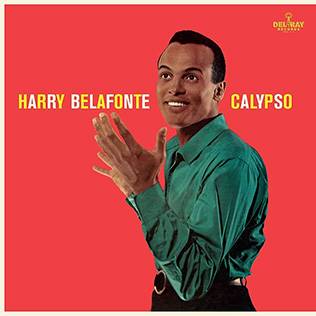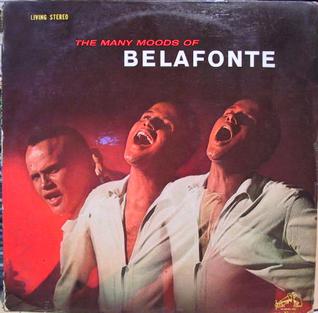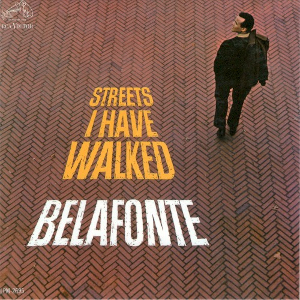Calypso is a style of Caribbean music that originated in Trinidad and Tobago during the early to mid-19th century and spread to the rest of the Caribbean Antilles by the mid-20th century. Its rhythms can be traced back to West African Kaiso and the arrival of French planters and their slaves from the French Antilles in the 18th century.

Harry Belafonte was an American singer, actor, and civil rights activist who popularized calypso music with international audiences in the 1950s and 1960s. Belafonte's career breakthrough album Calypso (1956) was the first million-selling LP by a single artist.

Lord Melody was a popular Trinidadian calypsonian, best known for singles such as "Boo Boo Man", "Creature From The Black Lagoon", "Shame & Scandal", "Jonah and the Bake", "Juanita", and "Rastaman Be Careful". Melody's career spanned forty years, from the beginnings of popular calypso music to his embrace of the more dance oriented Soca style by the late 1970s.

Calypso is the third studio album by recording artist Harry Belafonte, released by RCA Victor (LPM-1248) in 1956. The album became his second consecutive number-one album on the Billboard Top Pop Albums chart, where it peaked for 31 weeks. Calypso was the first Long Play record album to sell over one million copies.

Ralph Anthony MacDonald was an American percussionist, steelpan virtuoso, songwriter, musical arranger, and record producer.

Belafonte Sings of the Caribbean is an album by Harry Belafonte, released by RCA Victor (LPM-1505) in 1957.

Calypso in Brass is an album by Harry Belafonte, released by RCA Victor in 1966. The album contains new arrangements of previously recorded songs, notably from Calypso and Belafonte Sings of the Caribbean, with a brass ensemble accompaniment. The orchestra was conducted by Howard A. Roberts and arranged by Bob Freedman.

The Many Moods of Belafonte is an album by Harry Belafonte, released by RCA Victor (LSP-2574) in 1962. The album features performances by South African trumpeter Hugh Masekela and vocalist Miriam Makeba.
Irving Louis Burgie, sometimes known professionally as Lord Burgess, was an American musician and songwriter, regarded as one of the greatest composers of Caribbean music. He composed 34 songs for Harry Belafonte, including eight of the 11 songs on the Belafonte album Calypso (1956), the first album of any kind to sell one million copies. Burgie also wrote the lyrics of the National Anthem of Barbados. To date, songs penned by Irving Burgie have sold more than 100 million copies worldwide.

An Evening with Belafonte/Makeba is a Grammy Award-winning 1965 album by Harry Belafonte and Miriam Makeba, released by RCA Victor. It was the second outcome of the long lasting collaboration between Belafonte and Makeba, the first being the appearance of Makeba in the song "One More Dance" on Belafonte's 1960 album, Belafonte Returns to Carnegie Hall.
Arthur Eugene Jenkins, Jr. was an American keyboardist, composer, arranger and percussionist who worked with many popular music icons such as John Lennon, Harry Belafonte, Bob Marley and Chaka Khan.

An Evening With Belafonte/Mouskouri is an album by Harry Belafonte and Nana Mouskouri, released by RCA Victor (LPM/LSP-3415) in 1966.

Streets I Have Walked is an album by Harry Belafonte, released in 1963. The album contains songs from around the world as well as gospel songs. It reached #30 on the Billboard Albums 200, making it his last studio album to reach the top 40.

Belafonte at The Greek Theatre is a live double album by Harry Belafonte, released by RCA Victor in 1963. It was his last album to appear in Billboard's Top 40.

Ballads, Blues and Boasters is an album by Harry Belafonte, released by RCA Victor in 1964.

Belafonte on Campus is an album by Harry Belafonte, released in 1967.

Belafonte Concert in Japan is a live album by Harry Belafonte, released in 1974. The album was Belafonte's final release for RCA Records, concluding a 21-year association with the label.

Paradise in Gazankulu is album by Harry Belafonte, released by EMI Records in 1988. It was his final studio album, prior to his death in 2023. The album deals with the plight of black South Africans under the Apartheid system. The album was re-released as an official mp3 download by amazon.com, and iTunes in the U.K. in 2010.

Morning Star is an album by flautist Hubert Laws released on the CTI and recorded at Rudy Van Gelder's studio in 1972.
"Man Smart (Woman Smarter)" is a calypso song variously credited as being composed by Norman Span (King Radio), D. L. Miller, F. Kuhn, and Charles Harris. Span's authorship seems most likely since, as a popular calypso musician and songwriter, he first recorded the song in 1936, and none of the other ascribed composers are associated with calypso. Miller's music industry career began around 1950.















